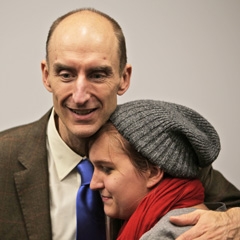News
GV Lanthorn: Last Lecture focuses on hope, storytelling
November 24, 2014

Last Lecture focuses on hope, storytelling
By STEPHANIE BRZEZINSKI
Published 11/24/14 12:49 a.m. Updated 11/24/14 1:46 a.m.
According to Aristotle, the function of tragedy is to evoke both pity and fear.
Grand Valley State University classics Professor Charles Pazdernik addressed the tragedy of his summer bike accident before a crowd of students and community members in the Mary Idema Pew Library Multipurpose Room on Nov. 20.
Pazdernik was the speaker for this year’s Last Lecture, an annual series based on terminal cancer patient Randy Pausch’s 2007 lecture. The lecture was Pazdernik’s first time back in Allendale since his accident.
Though he told a few classical stories during his lecture, the focus was on his July 2014 bike accident, which happened on the corner of Fulton Street and Prospect Avenue. His collision with a minivan caused paralysis from the chest down.
After surgery, he went to Mary Free Bed Rehabilitation Hospital to continue therapy and strengthen his upper body. Two and a half weeks later, he began to move his toes, so the staff started teaching him how to walk and use his lower muscles again.
“The story hasn’t ended, because I don’t know the ending,” Pazdernik said. “I’ve gotten much more back than most people get when they have an experience like mine. Even though I’ve accomplished a lot, I’m still profoundly damaged.”
In his talk, called “Blind Hopes?: Storytelling and Human Fortune,” Pazdernik highlighted the importance of Prometheus, a Titan who stole fire from the Greek gods and gave it to humans. Prometheus is also credited with giving blind hope.
“He gave us the ability to appreciate our morality,” Pazdernik said. “Blind hopes are irrational, unreasonable and unrealistic, but hope is a remedy, a medicine, a cure for the dilemma of morality.”
In addition to hope, storytelling is the other element that Pazdernik said defines who we are as humans.
“We tell stories to inform, to instruct, to entertain in order to make sense out of our experiences,” he said. “Storytelling is essential to make meaning out of our lives and to control what is outside of our control.”
Using art and literature is a way to acknowledge human limitations and weaknesses, Pazdernik said. He told the story of Cassandra as an example of this. Though a human, she was burdened by the ability to see the future, but she could not stop the bad things from happening, such as her murder.
“I think about people like Cassandra who don’t have hope,” Pazdernik said. “I have my blind hopes. If anything, I am the anti-Cassandra, because I don’t have the courage to look fear in the face and go forward.”
Abigail DeHart, a student of Pazdernik, introduced him as a “great scholar” who is active both inside and outside of the classroom.
“Dr. Pazdernik brings his academic pursuits to life,” DeHart said. “He can bring Greeks and Romans to life, but he also brings his students to life. Meetings with Dr. Pazdernik will always challenge you to dream big.”
